Sep 6
2013
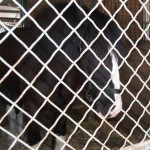
In a prior article we introduced the topic of Claiming Races and some basic information about how they work. Click here for a review of that article. Next we’ll discuss the topic of “Jail Time” and what in means in the context of Claiming Races.
After a horse is claimed out of a race, most states require that the new owner enter the horse at a 25% higher claiming price, if that horse runs within a month following the claim. It is during that period of time the horse is considered to be “in jail.” If the horse does not run during the month after the claim, he is considered to be “out of jail” and can then be entered for any level of claiming price. Here are some examples.
Read More >>
Sep 3
2013
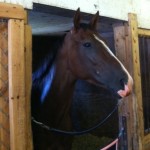
Treblemaker (Tom’s First Winner)
In a prior article we introduced you to a young trainer on the New York circuit. Click here for a review of the first article on Tom Morley. In this article we’re going to get into the challenges facing a new trainer in a very competitive sport. And, discuss some of the emotions involved in participating in a sport that is very much like being on a roller coaster ride … every day.
The horse on the left, Treblemaker, was his first winner, on April 13, 2013 at Aqueduct in only his second start as a head trainer. He won his first race at Saratoga on August 2nd, 2013 with Scribbling Sarah. But more about that in the interview.
Read More >>
Aug 27
2013
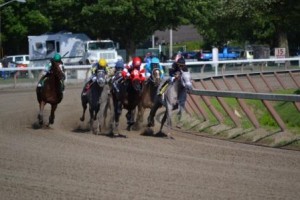
In a prior article introducing the Topic of Form, we listed a subtopic referred to as Hidden Form. This can mean a lot of things to a lot of people. For some it can involve a nefarious plot by trainer and owner to “darken” a horse’s form, thereby fooling the betting public, and collecting big odds when the horse next runs. We’re not saying this ancient practice of darkening a horse’s form is extinct, but we’ll save that topic for another day.
Hidden Form we’re describing in this article involves picking up on the subtle clues in a horse’s past performances (PPs) that indicate a horse is improving in ability, but still might get overlooked by the betting public for one or more reasons. For example, maybe the trainer or jockey riding the horse aren’t well known. But somewhere in the PPs you find something that reveals the horse has improving form, albeit a bit hidden.
Read More >>
Aug 25
2013
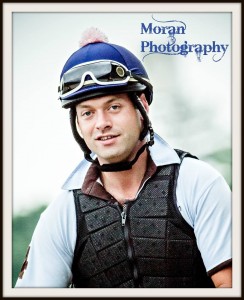
In an ongoing effort to bring to you, the fans, examples of real people working in the horse racing industry we bring you Tom Morley, horse trainer. Tom was mentioned in a prior post about Maggie Wolfendale, who works as the Paddock Analyst for NYRA.
In addition to her job at NYRA, Maggie is very involved in Tom’s business, working with the horses on a daily basis. They are involved in a personal relationship as well. (Update July 26, 2014: Tom Morley is now Maggie Wolfendale’s fiancee!)
Tom is a young trainer, who launched his own business in 2013. He had prior experience working for Eddie Kenneally as an assistant trainer. All of that we’ll get into, and more. He was very generous with his time, so we have a lot of material to write about Tom. So much, that we’re going to break apart the interview into multiple parts. This part will introduce you to Tom and set the stage for some very interesting insight into the life of a young trainer.
Read More >>
Aug 22
2013

Sanity bets are completely different than Saver Bets. While Saver Bets can save your day, Sanity bets can save your mind.
Picture this scenario. You’re studying the races one morning, and land upon a horse that you label your “Best Bet of the day.” Everything is right; experience at the distance, loves the surface, been very competitive at today’s class, 2nd start off a layoff (an angle you like). To top it off, the Morning Line favorite is 2-1, and you think he’s quite vulnerable. The morning line for your Best Bet is a juicy 8-1, and now you’re thinking, this is going to be a good day!
Fast forward to the afternoon at the racetrack. The race preceding your “Best Bet” completes, is marked official, and the early odds for your feature race displays on the Tote Board. The 2-1 morning line favorite opens up at 5-1. And your Best Bet opens up at 9-5. Ahhhh!
How can this be? You grind your teeth, frustrated at the price … hoping that it’s an anomaly. Hoping that the price will rise as you get closer to post time. And it does … up to 2-1. Ahhhh!
Read More >>
Aug 19
2013
You walk into the racetrack.
Buy yourself a program and a box of popcorn … sit down, and crack open a nice cold beer.
You scan through the races, looking for something familiar. A favorite jockey, number, or name. But this time, you decide no more … from now on I’m going to figure this game out. I mean how hard can it be? My Uncle Neal does it and he’s a few races short of a program.
So you buy yourself a copy of The Daily Racing Form. You’ve got a plan. Listen closely to the track’s public handicapper, follow along in the racing form, jot down what he says, hoping this will all make sense. So, you wait. Then ten minutes before post time he comes on, and in the span of two minutes, he says …
Read More >>
Aug 16
2013
Company lines are shown at the far right of the Past Performances (PPs) for a horse. The information presented is fairly straight forward. Each race includes the name of the top three finishers of the race; with additional information including weight carried and lengths separating the top three (technically four) horses. Also, if any of the top three finishers won their next race or if any of them are entered in today’s race that is identified as well.
So let’s start with an example using a couple of horses entered in the 6th race at Saratoga on August 14, 2013.
Read More >>
Aug 12
2013
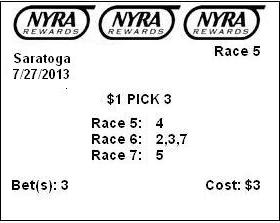
Saver Ticket
Spend enough time with horseplayers, and you’re bound to hear, “Had that one on a Saver ticket.” Saver tickets are often last minute, “I’m not getting beat by this horse, trainer, or jockey again.” In simple terms, it involves making wagers on horses that are not your top picks, or even your second best picks. Sometimes it’s throwing horses in the mix that seem like they have no chance at all.
Most of the time you end up crumpling these tickets up, but at least with some peace of mind that you covered the bases. With a race coming at you every twenty minutes, there’s something to be said for keeping your “peace of mind.”
And for the times you do cash one of these saver tickets, it’s usually a windfall return … because chances are the majority of the betting public didn’t have these horses on their radar either.
So, two Saver Ticket stories come to mind. One last summer at Saratoga, relating to an article about a race involving a 2-5 favorite that I thought was beatable. Click here for a full recap of that story. The other a couple of years ago, that is not my story, but one of my horseplayer friends, Vince.
Read More >>
Aug 8
2013

Saratoga – Top Of The Stretch
Horseplayers walk the thin line between Genius and Idiot all the time. And believe me, I speak from many days of experience. But, one day in particular stands out in my memory. It was August 8, 2009 … my son Michael’s 18th birthday and you can probably guess where we spent the day.
Deb and I went up early in the morning to claim some picnic tables at the top of the stretch. Mike was meeting a group of friends at the track for his “traditional” birthday party and we needed a place for all of them to sit. It’s the least I could do for him on his birthday you know.
Read More >>
Aug 5
2013
Post position refers to the position of each horse in the starting gate, starting from the inside rail and working out. This is usually, though not always the same number as the wagering number for each horse. The times when it differs is when you have a “coupled” entry in a race. A coupled entry is when two or more horses are running for the same common ownership.

Looking at the picture to the left, and working from the inside out, you can see that the #2 horse is in post one, #3 in post two, #4 in post three, etc. Following #7 is the #1A horse in post seven. #8 must have been scratched, so #9 follows #1A in post eight. Since there is no #1 horse, we know that he must have been scratched too.
Post positions in and of themselves are not important. Post positions relative to where the starting gate is located on the track, the running style (e.g. early speed vs. closer) for each horse, and the size of the field are quite important.
Read More >>







